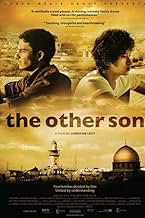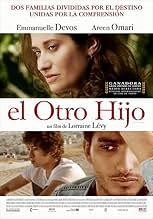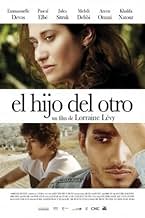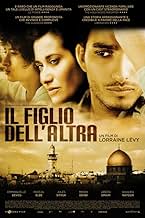IMDb RATING
7.3/10
3.9K
YOUR RATING
Two young men, one Israeli and one Palestinian, discover they were accidentally switched at birth.Two young men, one Israeli and one Palestinian, discover they were accidentally switched at birth.Two young men, one Israeli and one Palestinian, discover they were accidentally switched at birth.
- Director
- Writers
- Stars
- Awards
- 2 wins total
Mahmud Shalaby
- Bilal Al Bezaaz
- (as Mahmood Shalabi)
Tomer Offner
- Ilan
- (as Tomer Ofner)
Gilles Ben-David
- Le directeur de l'hôpital
- (as Jill Ben David)
- Director
- Writers
- All cast & crew
- Production, box office & more at IMDbPro
Featured reviews
Baby switching error at hospital is the same motif with "Like Father, Like Son", but these movies have completely different viewpoints. In case of "Like Father, Like Son", as the wrongly switched children are still very young, the story is told from the parents viewpoint. The key question asked in the movie is: what makes the parent-child relationship true, under the biological relationship is denied. On the other hand, in case of "The Other Son", the wrongly switched children are already 18 years old, intelligent, tough-to-fudge youths. Furthermore, one is a Jew and the other is a Palestinian. Therefore, in this movie the story is told from both of parents' and children's viewpoints, more on the children's viewpoint. Thus, the title of the movie can be "The other parents" or "The other self" too.
In general, in the movies where a family faces an extraordinary problem, fathers are less reliable than mothers. In this movie too, the first reaction of the two fathers is to deny the fact. They try to think as if nothing happened. Mothers, however, immediately face the issue, share empathy with the other. Well, I am a man, but I have to agree with this development. The plot is simple. Both parents do not have complicated private background. Still, this is a heart-moving one. The most impressing scene for me was that Joshua suddenly sings at the dinner. Is it a Palestinian song?
In general, in the movies where a family faces an extraordinary problem, fathers are less reliable than mothers. In this movie too, the first reaction of the two fathers is to deny the fact. They try to think as if nothing happened. Mothers, however, immediately face the issue, share empathy with the other. Well, I am a man, but I have to agree with this development. The plot is simple. Both parents do not have complicated private background. Still, this is a heart-moving one. The most impressing scene for me was that Joshua suddenly sings at the dinner. Is it a Palestinian song?
While the world continues to struggle to understand the constant schism between Palestine and Israel and yet permutations of that unsettled hot fire whose coals continue to smolder between aggressive flares, along comes a film such as this one - THE OTHER SON or Le fils de l'autre - and provides some insights that at least for the moment offer a better understanding of a very long struggle. Based on an idea by Noam Fitoussi who wrote the screenplay with Director Lorraine Lévy and Nathalie Saugeon, this is a gentle film about resolution of conflict - at least on the family level. It is a French production filmed in the West Bank and Israel under the sensitive direction of Lorraine Lévy.
It's not uncommon for those who rightly resent being biologically categorized on government questionnaires, to defiantly write in 'human' when asked to indicate their race. And the same holds true in its own compelling but curious way for the switched at birth DNA-driven identity crisis drama, The Other Son.
The relative stability of the two families in question - the Israeli Silbergs (Emmanuelle Devos and Pascal Elbéand) the Palestinian Al Bezaaz (Areen Omari, Khalifa Natourkin, and older son Mahmud Shalaby) in the West Bank - is shaken up when eighteen year old Joseph Silberg (Jules Sitruk) puts his musical aspirations on hold to report for mandatory military duty. But an army blood test confirms that he could not be the child of his parents, an odd stratagem, that a military on such permanent alert would be so thorough, especially since Joseph's father is a high ranking commander. But during a Gulf War missile attack near the Haifa hospital where Joseph was born, a Palestinian mother gave birth at the same time. And in the ensuing confusion, the babies must have been released to the wrong women. Joseph's distraught parents first waver, then seek out the Al Bezaaz family. And Yacine (Medhi Dehbi), their designated 'other son' in question, who has returned home for a visit from his medical school studies in France. While alternately fearful and hopeful mixed emotions become entangled, compounded by a profound cultural divide along with two fathers into deeply disapproving denial. Yet it is the coming together of the three 'brothers' that offers a ray of nope that in time this festering conundrum may be resolved.
The cast is splendid, especially Jules Sitruk and Medhi Dehbi whose humanity holds the story together. Highly recommended. In French, English, Arabic, and Hebrew with subtitles.
Grady Harp
It's not uncommon for those who rightly resent being biologically categorized on government questionnaires, to defiantly write in 'human' when asked to indicate their race. And the same holds true in its own compelling but curious way for the switched at birth DNA-driven identity crisis drama, The Other Son.
The relative stability of the two families in question - the Israeli Silbergs (Emmanuelle Devos and Pascal Elbéand) the Palestinian Al Bezaaz (Areen Omari, Khalifa Natourkin, and older son Mahmud Shalaby) in the West Bank - is shaken up when eighteen year old Joseph Silberg (Jules Sitruk) puts his musical aspirations on hold to report for mandatory military duty. But an army blood test confirms that he could not be the child of his parents, an odd stratagem, that a military on such permanent alert would be so thorough, especially since Joseph's father is a high ranking commander. But during a Gulf War missile attack near the Haifa hospital where Joseph was born, a Palestinian mother gave birth at the same time. And in the ensuing confusion, the babies must have been released to the wrong women. Joseph's distraught parents first waver, then seek out the Al Bezaaz family. And Yacine (Medhi Dehbi), their designated 'other son' in question, who has returned home for a visit from his medical school studies in France. While alternately fearful and hopeful mixed emotions become entangled, compounded by a profound cultural divide along with two fathers into deeply disapproving denial. Yet it is the coming together of the three 'brothers' that offers a ray of nope that in time this festering conundrum may be resolved.
The cast is splendid, especially Jules Sitruk and Medhi Dehbi whose humanity holds the story together. Highly recommended. In French, English, Arabic, and Hebrew with subtitles.
Grady Harp
"The Other Son" (2012 release from France/Israel; 105 min.) brings the story of 2 boys who are about to reach their 18th birthday. As the movie opens, we see Joseph applying to enlist at an elite unit of the Israeli Air Force, requiring him to do various medicals tests. It isn't long before his parents learn that Joseph's blood type (A+) is not compatible with theirs (A=). After some investigating, it becomes clear that two babies were switched accidentally at birth. The other 18 year old is Yacine, whose family lives in Palestine's West Bank. Joseph is devastated when he finds out about the mix-up at birth. But what about Yacine in Palestine? And how will their families react? And their friends? To tell you more would spoil your viewing experience, you'll just have to see for yourself how it all plays out.
Couple of comments: first, kudos to writer-director Lorraine Lévy for bringing us this movie. The plot is entirely believable, and Levy treats the subject matter with dignity and respect. As you can well imagine, this is a delicate topic and if not done properly, it will ruin the movie. When the impact of it all hits Joseph, he wonders "Am I still Jewish?". Even more importantly, this movie shows again that, when you put politics aside for a moment, at the end of the day we are dealing with real human beings. Watch how the Jewish and Palestine mothers deal with the news that the sons they have raised are not their own...
Bottom line: this movie should be required viewing for anyone interested in the Israeli-Palestine conflict. No, "The Other Son" is NOT a political movie, but instead is a heartbreaking family drama with a political undercurrent. "The Other Son" is HIGHLY RECOMMENDED!
Couple of comments: first, kudos to writer-director Lorraine Lévy for bringing us this movie. The plot is entirely believable, and Levy treats the subject matter with dignity and respect. As you can well imagine, this is a delicate topic and if not done properly, it will ruin the movie. When the impact of it all hits Joseph, he wonders "Am I still Jewish?". Even more importantly, this movie shows again that, when you put politics aside for a moment, at the end of the day we are dealing with real human beings. Watch how the Jewish and Palestine mothers deal with the news that the sons they have raised are not their own...
Bottom line: this movie should be required viewing for anyone interested in the Israeli-Palestine conflict. No, "The Other Son" is NOT a political movie, but instead is a heartbreaking family drama with a political undercurrent. "The Other Son" is HIGHLY RECOMMENDED!
The French film, "Le fils de l'autre," was shown in the U.S. with the title "The Other Son" (2012). It was co-written and directed by Lorraine Levy. As the title suggests, the movie plot hinges around two young men, born at the same time in the same hospital, who were switched by mistake. To make the situation even worse, one set of parents is Palestinian, and one is Israeli.
Once everyone comes to the realization that the mistake truly happened, the men are faced with the knowledge that their "parents" aren't their biological parents, their religion is not what it would be if the switch hadn't happened, and their position within the Palestinian-Israeli conflict has been reversed.
The only good news is that both sets of parents, and both of the young men, are people of good will. They all want to work out some sort of arrangement that will make this bizarre situation a little less painful.
The knowledge about the switch is a life-altering event for all six people. How they survive--or don't survive--this event is what makes this such a fascinating film. This movie will work well on DVD. I suggest you seek it out and watch it. It will repay the effort
Once everyone comes to the realization that the mistake truly happened, the men are faced with the knowledge that their "parents" aren't their biological parents, their religion is not what it would be if the switch hadn't happened, and their position within the Palestinian-Israeli conflict has been reversed.
The only good news is that both sets of parents, and both of the young men, are people of good will. They all want to work out some sort of arrangement that will make this bizarre situation a little less painful.
The knowledge about the switch is a life-altering event for all six people. How they survive--or don't survive--this event is what makes this such a fascinating film. This movie will work well on DVD. I suggest you seek it out and watch it. It will repay the effort
There is the intense interplay between the pain of the sons and the pains of their parents simultaneously being explored with the back drop of the apartheid and mutual hatred caused by separation and discrimination. You can see this in verbal confrontation between the fathers, each with their own valid views, each honest men trying to do right by their families.
The transformation f both sons and the human connections on all levels would give hope for a peace but for the fact that in reality, the wall exists and there is only hardening of sides going on. The overall character and plot development of this movie is excellent. The lack of card board villains gives the movie a much more honest texture.
The transformation f both sons and the human connections on all levels would give hope for a peace but for the fact that in reality, the wall exists and there is only hardening of sides going on. The overall character and plot development of this movie is excellent. The lack of card board villains gives the movie a much more honest texture.
Did you know
- ConnectionsReferenced in Elle s'en va (2013)
- How long is The Other Son?Powered by Alexa
Details
Box office
- Gross US & Canada
- $1,285,918
- Opening weekend US & Canada
- $125,691
- Oct 28, 2012
- Gross worldwide
- $3,820,405
- Runtime
- 1h 45m(105 min)
- Color
- Sound mix
- Aspect ratio
- 2.35 : 1
Contribute to this page
Suggest an edit or add missing content































